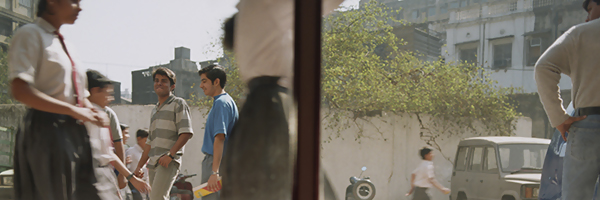
Rajdani Express
My last night in India, I was invited to dinner at the house of Mr. Sen, whom I’d met a few weeks earlier in the overnight train from Calcutta to Delhi. Fifty-ish, wearing a neatly trimmed salt-and-pepper goatee and highly polished chestnut-colored shoes, he exuded an air of unshakeable bourgeois calm and rectitude. As I sat down in my place facing him, I wondered where he could be going, because he was bundled up in an overstuffed tan anorak as if for an expedition to the North Pole. It turned out the North Pole was inside the train itself, once it started moving and the air-conditioning came on.
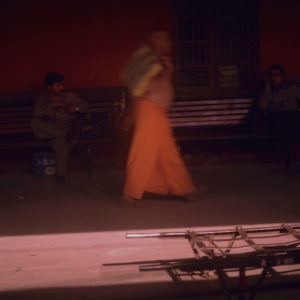
Train station. Baroda, 2002
In addition to the goatee, the shoes and the anorak, his attire was completed by a neat blue and black plaid flannel shirt, and starched and sharply creased khakis. On his nose sat a pair of oversized gold-rimmed aviator glasses. Only the formal shoes looked like they belonged to him, or had ever been worn by anyone ever before. He was the kind of man who always looks like he is wearing a suit, no matter how he’s dressed. To this inescapable identity of suits and offices and meetings and briefcases, he brought also an air of irreproachable, well-scrubbed neatness, that went far beyond the normal requirements of mere respectability.
What made me start up a conversation with him was the fact that he was reading a Sidney Sheldon novel, right out there in the open, where everyone could see him. As he brought the book out from beneath a stack of newspapers and magazines, a little smile came to his lips, and he wiggled slightly in his seat, getting comfortable for a nice long read.
We fell into an easy sympathetic conversation, once we started talking, about something I was reading in the newspaper, the kind of conversation one has with old friends, silliness replacing gravity from one moment to the next, and returning from laughter to thoughtfulness just as quickly and easily. Sometimes we looked at a thing, the topic of our discussion, as if standing side by side, shaking our heads in mutual despair over the crumbling condition of the magnificent colonial architecture of Calcutta; at other moments we looked at each other, bemused, across the enormous gulf of our differences, cultural and personal, as when I told him my work often kept me away from home, sometimes for months at a time.
“Are you married?” he laughed.
Was it my first time in India, what hotel was I staying at, government corruption, religious extremism, AIDS, dowry deaths; as much as he willingly answered all my questions, equally was he curious to know what I thought, saying only, “Acha,” or “I see.”
In his meditative gaze I could see the thought turning over in his mind as he examined it from all sides.
About the hotel he said only, “Ah, that used to be a good hotel.”
“It’s still nice,” I replied, recalling when, at dinner the night before I had watched, along with a silent row of half a dozen waiters, an enormous rat stroll between the empty tables of the hotel’s “Drop Inn.”
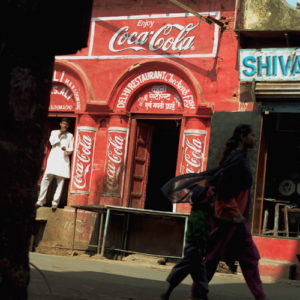
A street in Old Delhi, 2000
There appeared to be nothing that could not be discussed; no question that could not be asked in a conversation between two adults, strangers brought together by chance, to share, momentarily, a common, public space. His particular standard of plaid flannel and gold aviator bespectacled civility excluded all possibility of personal offense, and required absolute candor. Nothing he heard–no matter how surprising–and sometimes I could see Amazement clearly written all over his face–made him withdraw into the ever present possibility of rejection, which would cause him, following a few moments of polite silence, to open his book, turn his eyes to the page, and end the conversation.
And yet, beneath the hands quietly folded in his lap, there it was, the lurid cover of the Sydney Sheldon novel. My eyes returned to it again and again, but I never found a way to ask him about it. As our conversation lengthened into the night, I felt I should let him get to it; beneath the newspaper on my lap whose article had started all this, I, too, had a book waiting for my attention, as well—but at no moment did I ever sense I was keeping him from anything he might rather be doing. Instead, I had the feeling that nothing existed for him but this conversation, which would end only of its own accord, at some time after the present moment had come to an end, completed, and, therefore, a time that didn’t exist.
When it was time to go to sleep, I was wowed but not surprised to see him come back from the bathroom wearing blue and white striped flannel pajamas, and the impeccable brown shoes, of course, carrying his shirt and trousers folded neatly over one arm. He showed me how to turn our seats into a bed, and asked me several times if I didn’t prefer the upper berth, which was, in principle, his. His insistence made me understand that the difference between the upper and lower had something to do with his self-appointed duty to look out for my virtue; also that he’d asked for it especially.
At the Delhi station, he gave me his business card and made me promise to telephone him when I came back to Calcutta. Red-turbaned porters and travelers and streamed around us as we stood on the platform like rocks in a stream, saying our goodbyes.
The last thing he said was, “Delhi is a very business-like town. You will find the people… not as nice as people in Calcutta.”
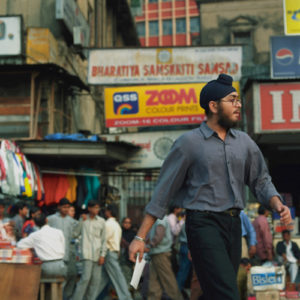
Chowringee Road, Kolkata, 2000
Then he shook my hand and turned away, disappearing instantly into the shouting, bustling crowd.
A month later, I called him at the office number on the business card. “Chief Executive” was engraved below his name, the letters stamped deeply into the thick, snow-white bristol. When I said my name into the telephone, his voice shot into soprano range as he exclaimed, “Oh! Hello! You’re back!”
In the next sentence he invited me to dinner the following night. “My wife is looking forward to meeting you!”
When he came to fetch me he was wearing a crisp gray houndstooth double-breasted suit so stiff it looked like it was holding him up rather than the other way around. He looked, indeed, every inch the perfect Chief Executive, far more completely himself than he had wearing the khakis and flannel shirt, both pleased and a little bashful to display the stunning authority the suit gave to him.
We climbed into his little dark red Maruti and drove off. He was a very careful driver. For a few moments we didn’t say anything.
Then I said he had been right about Delhi, and that Calcutta was still my favorite city in India.
This pleased him very much. “You see India,” he cried, delighted. “You see it truly!”
It was as if, now that I had seen Delhi and Bombay, he could believe me. He swerved abruptly around a taxi as it cut him off in the heavy evening traffic.
“When did you begin to like Calcutta?” he asked, giving the taxi driver a cold stare I wouldn’t have thought him capable of, and swinging the Maruti back to its proper place in front of the offending cab.
“As soon as I got off the plane,” I said, remembering the drive out of the hot, sleepy airport, the taxi plunging immediately into a maelstrom of people, all manner of conveyances, and animals, especially cows, grazing by the side of the dusty road, and more people; people everywhere.
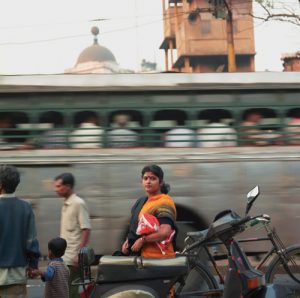
Sudder Street, Kolkata, 2000
But I didn’t tell him about the smells. The ochre smell of dust and coal fires that hit me as soon as I stepped onto the tarmac of the airstrip. The taste on the back of the tongue of gritty black diesel clouds shooting out in maharajah plumes from trucks and buses and cars and auto-rickshaws. The purple baritone smell of incense, billowing from food stalls and temples. The almost visible curtain of spice odors that hung, motionless and heavy, everywhere. Tea smells. Underlying it all some other thing, unidentifiable, that smelled perhaps like chalk, or perhaps happiness. The whole of it making me feel I had just arrived somewhere.
“Ah, cha,” he said.
At a traffic light I showed him my wrist tied with a red and yellow thread, that I had acquired while accompanying my friend Amrita to the Kali temple a few days earlier.
This trip to the temple had started out as a day-trip to the Shantiniketan University. I had casually asked her if she wanted to come along with me, on a short train-ride outside Calcutta. Five telephone calls later, during which she kept me informed of each stage of the negotiations with “Them,” Amrita, 30, mother of two, had received permission from her husband, her mother-in-law, her brother-in-law and her sister-in-law, to take the local train an hour out of town, walk around Shantineketan campus for a few hours, and take the train back “as long as she was home by six-thirty.”
“This is the first time I’ve gone out of the house alone,” she said, “I’m almost excited.”
“What would it take,” I asked, “for you to be excited?”
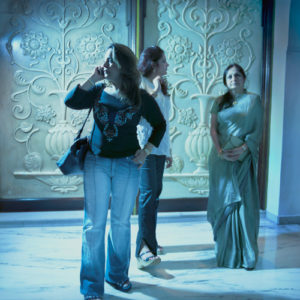
Taj Hotel, Mumbai 2003
But the next day we were late to the train, despite being driven at breakneck speed through the Calcutta traffic by a uniformed house servant. Even before we reached the station, he turned around and said something to Amrita, and she said, in a dull voice, “We’ve missed the train, we might as well go back.”
I said, “Why? We’ll take the next one in an hour. For that one we’re very early.”
“No,” she said, “I won’t do that.”
And so we went back to her house and sat, without speaking, on the veranda.
After nearly an hour she said, “I feel so comfortable with you, I don’t feel we have to talk.”
Then we sat like that for two more hours, and then we ate lunch. After lunch I left, leaving her and “Them” to their afternoon nap.
A few days later she called me up and said, “Everyone’s out of town. I’m all alone here. Would you like to come over tonight?”
So a car had come to fetch me, and, as if at the spur of the moment, we went out to the Kali temple.
In a cloud of incense and clanging cymbals, I stood beside Amrita while she silently mouthed prayers, eyes closed and head bent. Behind her, was a large, garland-draped statue of the goddess Kali, above which hung a sign that said “Please do not kill the mosquitoes.”
Below that, another sign stated, “It is forbidden to extort the pilgrims.”
A man took me aside and asked me to sign a guestbook. Then he wrote 300 rs next to my name. At this moment, Amrita, having finished her devotions, came over. She looked into the book and asked me blandly, “Do you want to give him 300 rupees?”
“No,” I said.
She spoke a few words to him, and, borrowing his pen, drew a line through my name and what he had written.
An old lady tied a string around my wrist and Amrita’s wrist, and said a prayer.
After that, we left the temple. The driver took us back to the house where we drank iced-tea, and ate vanilla ice cream, and Amrita told me about the love letter she’d received from her husband’s best friend.
Now the string was turning my arm yellow. In the car, holding my wrist up in the dim twilight, I asked Mr. Sen, “Do you know how long I must keep this?”
He considered the question for a moment, looking thoughtfully at the thread. “You can take it off. Give it to me and I will throw it into the Ganges for you.”
I thanked him as he untied the thread, folded it up, kissed the neat bundle, and tucked it into the breast pocket of his jacket.
The traffic light changed to green and he put the car into gear. A few moments later he pulled over to the side of the road, explaining he had some things to pick up at the chemist’s.
Waiting for him in the car, I watched a glossy chocolate-brown goat amble in the gutter, her ears bouncing lightly with each step. Behind her, a tramway screeched into the intersection. Floods of people poured from its doors, fanning out over the vast crossing, women descended from the ladies’ car into the twilight, their bright saris floating up around them like flowers blooming.
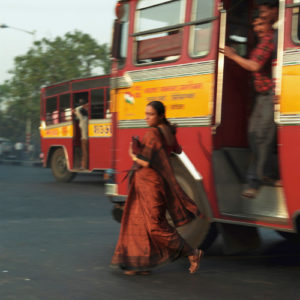
Outram Road, Kolkata, 2000
The goat strolled along in her own little world, ignoring delicious bits of crumpled paper and straw beneath her delicately stepping feet, in favor of some other, nobly obscure dream. I could have been born this goat, I thought. Why am I not this goat? And where does she sleep at night? When she is old, and has no more milk to give, what will happen to her?
Mr. Sen came back with four enormous plastic shopping bags bulging with boxes and bags of herbs. I wondered if all those medicines could be for him alone, or if there was someone else at his house who was very ill, indeed if everyone at home wasn’t gravely ill, so as to require so much treatment, and the Sydney Sheldon novel-reading came to my mind again.
Somehow managing to squeeze all the bags into the back seat, he slid back into his place behind the wheel, and we moved smoothly back into traffic as the first street-lamps flickered on.
By the time we turned off the main road, it was night and the tramway lines were far behind us. We drove through some quiet residential streets lined with big dark houses surrounded by large dark trees gently nodding over shadowy gardens. Mr. Sen was telling me he was leaving his job as Chief Executive.
“They want to send me to Punjab. To build a big exchanger on the main highway there; it’s a very big job, it will take nearly a year. But it’s all the way on the other side of India, and I don’t want to leave! My son is passing his exams this year, my daughter next year. If I’m not here, they won’t study. So I’ve decided to start my own company…”
He pulled the car over to the curb and stopped. “This is my house,” he said simply, “I built it.”
The house was very big, a featureless black silhouette. Unlike Amrita’s house, there was no wall around it. All the houses in the neighborhood looked newish and very large; there were no walls around any of them.
Mr. Sen’s house seemed by far the biggest. A silhouette emerged from nowhere and took the car away to park it. We walked up a rough flagstone walkway toward the house. In the middle of the black rectangle a door flew open and a ribbon of yellow light streamed out. Suddenly I was in the center of a bright bouquet of excited, noisy people, all talking at once, in Bangla to each other, in English to me, each one introducing himself, or being introduced, and everyone pressing so close to me that any closer and we would have been together inside my clothes; yet no one made not even the slightest actual, physical contact.
I wasn’t exactly sure how many people there were altogether. In the general hubbub I shook Mrs. Sen’s hand, someone presented the children to me, first a very tall and fantastically skinny young man with a foghorn voice and a prominent, bouncing Adam’s apple, then, an adolescent girl wearing jeans and a loose shirt. I immediately forgot their names. There were also some other adults and a gaggle of children, who turned out to be part of a large family of servants. Another teenager was somehow extracted from the bubbling crowd and presented to me by means of a very long and specific string of family connections: the sister’s brother’s husband’s daughter’s etc., out of which I gathered that she was a cousin.
The cousin, vivacious and giggly, pulled herself together and, drawing herself up to her full height, announced, very convincingly “Bon soir,” then looked terrified for about thirty seconds before blurting out that she had been studying French for only two months, and that was really all she knew how to say.
Introductions became welcomes, welcoming me into the house, each person contributing to the project of advancing and hindering our little herd in its shuffling gyration toward the vestibule, where we stopped for a moment while Mr. Sen took off his suit jacket and carefully hung it on a hangar, and put the hangar on a coat-stand. Then we muddled off again. Via a multitude of solicitous gestures, each member of the little crowd communicated, in his or her own way, that they all agreed: they would have preferred to pick me up and carry me through the house, rather than letting me walk on my own legs down the tiled hallway to the living room.
When we sat down, and I could begin to sort everyone out, I saw that Mrs. Sen was almost frightened by the fact of receiving me in her home. Although her English was perfect, and she understood me perfectly, after every sentence she said, or I said, she hesitated for a moment, as if unable to believe she could have got it right on the first try, and felt the need to mentally double-check. I wondered what Mr. Sen had told her about me.
She was saying something about romantic love. “It doesn’t last. Only two years, at the most,” she said.
In the train, Mr. Sen had said, “If it is handled with intelligence, and sensitivity to the personalities of the young people, arranged marriages are often happier than love marriages.”
After the customary, brief hesitation, Mrs. Sen went on, considering this thing, romance. She looked at me, her eyes bright. “I think you should have one romance that lasts only one year, because then you can keep a perfect memory forever. After that you can get married… to somebody else!”
She threw herself back against the cushions, overcome with giggles.
In the train, I had asked Mr. Sen, “Do you have any children?” He had looked like a light-bulb had lit up inside him.
“We have one boy and one girl,” he’d replied, looking down at his hands as he said this, in a futile effort at modesty, a wild enthusiasm surging out of him into the chilly atmosphere, warming train compartment.
Now, he sat in “his” armchair, the television remote on a little table next to it had warned me off at the very last second, as I had started to sit down. His hands curled over the ends of the chair’s arms, like a pilot at the cockpit controls.
Grinning widely, delighted, he thrilled at this, the daily miracle: his house, his wife, his children.
A little boy brought Mr. Sen a glass of whiskey and water and a little metal box containing paan while the family looked on in helpless despair, each one making little comments in English and Bangla.
Variations of “the doctor says,” floated around the room, along with shaking heads and worried glances.
Ignoring them, Mr. Sen took the glass and the box from the boy and set each one down in its proper place beside the television remote, getting set for a terrific evening.
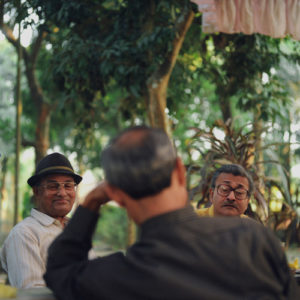
West Bengal, 2003
“Tell them what you said to me in the train…” he said over and over, and then told them himself in Bangla; everyone roared with laughter. No one ever bothered to translate back into English all these fascinating and witty things I was supposed to have said, so I had no idea what they were talking about. It didn’t seem to matter, and they were so gay I couldn’t help but laugh with them.
“I liked you because you said you liked Calcutta,” he repeated several times, and I remembered how, in the train, he had laughed and shook his head incredulously when I said I had arrived first in Calcutta, and how much I liked the city and the people there.
“You see India, you see it truly!” he said now, ignoring me when I said I didn’t see how anyone could really “see” India in only a few weeks.
Then we were talking about the Holocaust, Mr. Sen somehow finding a way to work into this conversation his conviction that I had been Indian in a former life. I felt relieved to discover that their grasp of the contours of my world were as vague as mine of theirs.
Mr. and Mrs. Sen shook their heads, uncomprehending, looking truly distressed, something in them recoiling, shrinking from the horror of the very thought of it. “Such a terrible thing… Why did Hitler want to kill all those people?”
But I never really got to answer any of their questions, because Mr. Sen always broke in to say, “Tell them what you said to me on the train…,” or food came, and then more food.
The arrival of the food created a flurry of enthusiasm, everyone’s attention focused on the plates. The first plate, heaped with meat kebabs, was set down before me with a flourish by one of the children in the family that had greeted us at the door. I had a brief moment of panic, as it occurred to me that they might expect me to eat all of it as they sat and watched, while continuing to ask me endless questions. Under those conditions, I figured it would take me several miserable hours to grind through the enormous pile of meat, and I resolved to resist, no matter how rude it might be.
But once I took the first kebab, the plate was passed around, and everyone fell to.
Mr and Mrs Sen had traveled in Europe and the US. Mr. Sen recounted a long story about a bathroom in a hotel in New York that I didn’t understand, but made everyone laugh very hard, even though they must have heard it several times before. Mrs. Sen asked me about my trip, her questions coming out in a disconnected sequence, as random memories of her own experiences traveling abroad rose in her mind. She was very concerned about how I felt about Indian food, and said how hard it had been for her in Europe.
“Yes,” I said, hoping to avoid having to answer before the meal was over, “I believe you say ‘the torture of boiled vegetables’…”
“Oh yes, it was terrible! And the chocolate! So bitter! And when we went to the grocery store, those labels—we couldn’t understand what anything was!”
She looked at me, hesitating.
“French people…” she said, bewilderment all over her face.
This is my curse, I thought to myself, to be an American living abroad, held up constantly by indignant Europeans for explanations of the policies of the US government, and, on top of that, to live in France, and have to defend French people to the entire world as well.
It wasn’t hard for me to imagine how cold and unfriendly the French would seem to Mrs. Sen. I tried to picture her in the dairy section of a gleaming supermarket, wearing the unpleasantly confining European clothes, vainly trying to decipher the difference between fromage frais and crème fraîche. I could easily imagine the ever-rushing Parisians brusquely reaching around her, with nothing to offer in the way of assistance beyond a raised eyebrow for the bindi on her forehead.
I remembered a dinner party I had attended shortly after arriving in Paris, at which I had dropped a heavy silver fork on the parquet floor. Despite its resounding clatter, the conversation had gone on uninterrupted as if nothing at all had happened. As I bent to pick up the fork, I realized what this would mean for me, coming from America, where fitting in and pleasing others is so important, and where such social clumsiness would have earned at worst, good-natured ridicule, or at best, the hasty offer of another fork; some recognition, in any case, to put the gaffer at ease. But in this case, only silence, for me to interpret as I might.
Even as I found the careful French neutrality unnerving and even frightening, I had also seen in it an opportunity for a certain kind of freedom; to think what I liked, say what I wished, without immediately being offered another fork. I recognized in that concerted silence at the dinner party a certain standard of civility, different from the one I had grown up with, and different yet again from the one Mr. Sen had shown me in the train.
Now, remembering the long-ago incident, sitting in the warmth of Mr. Sen’s living room, I thought there couldn’t possibly be two standards of civility and courtesy more different.
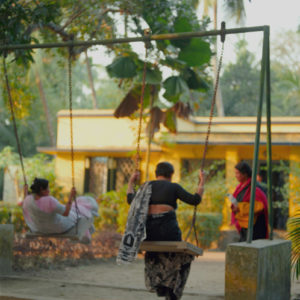
West Bengal, 2003
To answer Mrs. Sen, I tried to use what I had learned from Mr. Sen about his standard of civility. “In French culture,” I said, “it’s not very important to be considered ‘nice.’ ”
She looked more confused.
I said, “The idea is, you only have to be ‘nice’ if you’re so dumb you have no other choice.”
She looked thunderstruck for a moment. Then she was transported by a gale of giggles—by the time she spoke everyone in the room was already laughing.
“You know what they say where he’s from?” She tilted her head in the direction of Mr. Sen. “They say, somebody is as nice…as nice as a cow!”
Everyone was roaring, but, the French standard of civility asserting itself, I wasn’t sure if I should join them. “I thought you liked cows very much here?”
This made everyone laugh even harder. As seriously as if he were replying in an exam, the son said, in an earnest, foghorn voice, “Cows are considered to be very…innocent.”
Lifting her chin again toward Mr. Sen, Mrs. Sen said, “I never call him by his name.”
“How do you get his attention?” I asked, made reckless by the general hilarity. “Do you say, ‘Hey you?’”
She nodded. “Yes, something like that. Or else it’s just the two of us. Or I ask one of the children to call him for me.”
The son explained, using his classroom voice again, “We can call him by name because we have the same blood.”
It came out that Mrs. Sen and I were the same age, exactly. We sat side by side on the sofa. Mrs Sen wore a sari. Silk, an olive green motif on a reddish-brown background. I would have liked to feel this silk between my fingers, to feel its weight, whether it was stiff or soft, ask her a hundred questions about it. Where did she buy it? In a shop with a big glass show window like the one I’d seen in Park Street, in the center of Calcutta? Or in one of the little stalls in the market? These colors, what did they mean to her? To me, the subtle design of muted tones, so grand and understated, made it a dress-up sari, for sure. And how had she chosen this one, for this occasion? All these things I would like to know, and understand, and arrange each piece of information in its proper place beside the easy laugh, the warm, confiding manner, this life, this house, these children, her husband.
I wore the same jeans I’d been wearing nearly every day for over a month. Sitting across from her sat her 18-year-old son. Even seated, he towered over her. To my left, on the floor, sat my camera bag. Eighteen years ago…what had I been doing? Arriving for the first time in Paris, on a gloomy January day, wearing a friend’s sweater, for luck, carrying, in the first of many bags, a different camera, and an as yet unused pocket-sized bi-lingual dictionary.
But even longer ago than that, I remembered running barefoot across the neighbor’s lawn at dusk with a gang of four year-olds, all of us unbearably excited to be out so very late in the last darkest moments before the street lamps came on. Shouting, noses streaming, we never wanted to go home. Running, running, running and then twirling, twirling and laughing, and falling on to the chilly grass to look at the nearly night sky spinning behind the apartment buildings, feeling the earth rolling through the heavens like a huge ball. Dizzy and breathless, my four-year-old self thought, this, here and now, is the whole great Earth turning while I am right here, on this exact spot, exactly on the other side of the world from China. Where everything is upside down.
Had my life had been about drawing out those last minutes before the street lamps came on? Or so it seemed to me now, sitting, not in China, but nearer to it than my four-year-old self could ever have imagined, on the sofa in the Sens’ living room. Perhaps this was another kind of ‘everything’ like the ‘everything’ Amrita had talked to me about.
And when we talk about choices, I wondered, what do we think we mean?
“In India,” Mrs. Sen said, “41 is old.”
She looked at me, an unspoken question drawing an upside-down U above the bindi on her forehead. I had the feeling, had we been alone, she would have said something more.
“Where I come from,” I said, “we say life begins at 40.”
Her face lit up. “Yes! Yes! It’s absolutely true!”
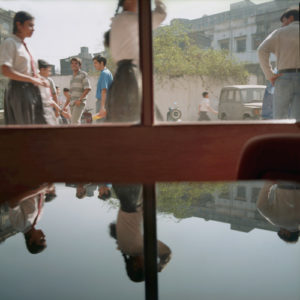
Schoolgirls in Tottee Lane. Kolkata, 2000
It was as if she had always known this without actually thinking it. Her enthusiasm for the idea seemed to make her forget the other, unspoken question. Reflecting aloud, she began to work it out, in the same musing way that she had with the question of romance. “Because when you are younger, life is harder, there is so much to do, the children coming…it is only at 40 that you can really begin to enjoy things…”
The hors d’oeuvres finished, I was no longer hungry and we all trouped upstairs to have dinner in Mr. and Mrs. Sen’s bedroom.
By this time, it was about 10:30. A woman and a young girl brought in the plates of food, helped by the little boy who’d brought Mr. Sen his whiskey. I wondered if they lived in the house or somewhere else, and I remembered the room of a young man in Varanasi, and a shirt on a hanger high up on a dirty blue wall. I wondered if the little boy went to school and if he wouldn’t be sleepy in class tomorrow, and did his father worry about his exams the way Mr. Sen worried about his children’s exams.
Only the three of us, Mr. and Mrs. Sen, I, and the invited cousin, actually ate, sitting in deep cushioned armchairs, holding our plates on our knees, while the two children looked on, the boy sitting at attention on a straight-backed chair by the door, and the girl sprawled out diagonally across her parents’ bed.
Everyone fell silent, working on the plates.
Cleaning her plate in an instant, Mrs. Sen, leaned back in her armchair, and pointed her spoon at me like a miniature sceptre, “We eat with our fingers, you know. We are eating with this,” she described a gay little circle in the air with the spoon, “because you are here.”
Suddenly she was standing over me, looking into my face earnestly, holding out her hand.
“Let me take you to the bathroom,” she said.
And there was nothing for it but to give her my hand, and go with her.
In fact, we all went. I stood in the small tiled bathroom while everyone crowded around the doorway watching me. Standing in front of the sink, I hesitated for a second, to see if some clue would be forthcoming as to the nature of the protocol to follow in this situation. But it appeared that it was up to me to improvise.
Somewhat at a loss, I washed my hands. Seeing this, everyone dispersed, somewhat reluctantly I thought, from the doorway.
Back in the bedroom, we all sat down in our former places again. Mrs. Sen said, “It’s so easy to understand you, why is that? When I watch American films, or even English films, I can’t understand anything they say. And Oprah! Not one word! Are you speaking in some special way for me?”
“No, no I’m not,” I said, remembering a Pakistani cabdriver in Chicago who, thinking I had misunderstood his question, had insisted, “No, I mean, where are you from originally?”
After dinner was over we left the bedroom, stopping for a moment to look through the doorway of the puja room. It was the biggest room I had seen in the house, absolutely empty except for a very large altar at the far end stacked with statues of gods and goddesses, and covered with fresh garlands of orange flowers. Twenty people could easily have sat to pray in this room. I wondered did this ever happen, or was it that when Mr. Sen was designing the house he had said to himself, “And the puja room will be the biggest room in the house!” with the same devotion I had seen at another home, where framed photographs of deceased relatives were wrapped in specially sewn woolen blankets, only their faces showing over the top. “So they won’t get cold,” it was explained.
I would have liked to ask, ‘Now. How exactly do you use this room? Do you have lots of people over for prayers? Who takes care of it; who replaces the flowers? Do you sit or kneel here, or stand, or doesn’t it matter?’
But I felt that, already, we had passed a frontier in our brief acquaintance, and these kinds of questions would have been received only as a refusal to accept the invitation, so graciously offered, to pass through a door, so graciously opened, to another kind of mutual understanding.
No more food being delivered to the bedroom, we all thundered back down the stairs to the foyer where Mr. Sen had hung up his coat upon entering the house, when we had arrived a few hours earlier. He put the coat on again, replacing the hanger on the same branch of the coat-stand. Next to the coat-stand hung a very large, framed photograph of Mr. Sen, with his arm around a woman wearing a long white dress with puffy sleeves, and holding a matching ruffled parasol.
“Who’s that?” I asked.
“Oh,” Mr Sen answered, offhand, “Just an old girlfriend…”
“Really?” I looked more closely at the picture.
“It’s Mary Poppins!” said Mrs. Sen. “It’s Disneyworld!”
She looked at me, a little grin sneaking around her mouth. “They have a very big—what do you call it? You ride on a little track, up and down, very fast…”
“A roller-coaster?”
“Yes! That’s it! I love it!” She leaned toward me, lifting her eyebrows in the direction of Mr. Sen. “He doesn’t like it. When we got to the end he was hanging on so tight! The man had to tell him it was time to get off. And his face …it was all green.”
I looked at Mr. Sen to see what he thought of this. He didn’t seem to be listening, looking very intently at something on the ceiling.
I thought I saw him shake his head to himself, his lips struggling against a twin of Mrs. Sen’s mischievous little smile.
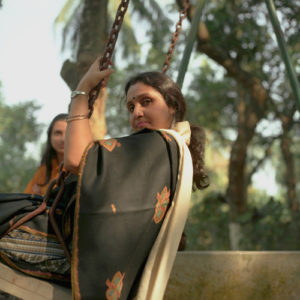
Swinging at a picnic.
West Bengal, 2003
“So I go by myself. The way it makes you feel—I can’t describe it…It’s fantastic! And they have another thing, too. A round thing, it spins around, then the floor goes away, and I was stuck to the wall, like…like a lizard!”
She smiled again and lowered her voice, “People laugh at me, they can’t understand it—at my age!”
Then it was time to go and we were all standing together in front of the house once again. I said, “I will say goodbye the French way.”
“But I’m coming with you,” said Mrs. Sen, as I kissed her on both cheeks.
Kissing the Sen family was like kissing a row of fence posts. Almost immediately, stunned embarrassment overcame us, but I didn’t see how I could stop once I’d started, so I just went on as if I hadn’t noticed anything. After I’d kissed the last person, the cousin, we all just stood looking at each other in shocked silence.
After a moment, in a tiny voice, Mrs. Sen said, “How can you say French people aren’t nice…if they do that all the time?”
We got in the car and headed off toward town. There was no traffic now. Sleeping houses lined the road, hulking crenelated soot-black silhouettes beneath a full moon ringed by a little yellow aura. I leaned forward from the back seat. “Do you know a film called Kaajal?” I said.
“Kaajal, Kaajal,” said Mr. Sen, looking at his wife. “Meena Kumari?”
“Is Meena Kumari in it?” Mrs Sen asked me.
“The saddest woman on Earth, dressed all in white?” I said.
“Yes, yes, that’s Meena Kumari.”
“And a really funny guy singing and dancing with a lot of women on the roof after a wedding?”
“Oh,” said Mr. Sen, “Mehmood. You like that?”
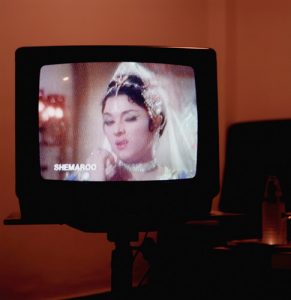
Padmini on television. Mumbai, 2000
“Oh,” I said, “I love that movie! So beautiful! And the music! That song the fellow who drinks all the time sings! It must be a classic.”
“No, it’s not a classic,” said Mr. Sen. “It’s just a movie. But if you like those old movies, you must see some of the black and white ones! They’re wonderful!”
“Oh, yes,” sighed Mrs. Sen. “Guru Dutt.”
“Waheeda Rehman,” said Mr. Sen.
And she began to sing, softly, lightly,Waqt ne kya kiya haseen sitam…
When the song was over, we didn’t talk any more.
Mr Sen turned the car easily around potholes without slowing down, zigzagging across the whole of the empty road, the warm night air billowing through the car, lifting Mrs Sen’s pallu. The wind brushed softly across our faces and sighed into the night.
Coming to an unlit portion of the road, the black sky clamped down to the edge of the asphalt, inking out everything except the potholes visible in the twin beams of the headlights. We drove right into a violent smell of raw sewage, thick and overwhelming as a rotting carcass. The stink muscled into the car, instantly crushing out all the breathable air.
Too late, Mr. Sen rolled up his window. We drove on and on, crammed into the car with the unbearable stench for what seemed like a very long time, until finally Mrs. Sen broke down and said something about it, her voice almost a whimper. Mr Sen gave a brief answer meant to be reassuring, and which made no sense to me, but did make it clear that nothing more was to be said about that.
In the back seat, I felt their misery—and their embarrassment–that I should witness this with them. It was as appalling as if I had caught either one of them out in a lie. Suffering along with them was of no help; it only added to their abjection. Such a smell of filth, such a neglected road, to be caught unawares in front of the foreign visitor—and all this coming after the mountain of meat kebabs, the cousin’s “Bon soir,” the collegial visit to the bathroom—it all might as well have been a sham.
Tomorrow I would be going back to the tiny part of the world I had come from, where the roads are mostly smooth, where sewage mostly stays politely beneath the ground, and, more importantly, even when it doesn’t, everyone agrees that it should, that this is the normal, the natural state of things. Sewage doesn’t just leap out of the ground and invade dinner parties. How many layers of pretending about the world would we have to peel away before broken roads and the odor of feces and putrefaction could be included in our idea of normalcy? And along with that, the helpless knowledge that there is no one to complain about it to. What kind of face would we be putting on things then? Would I be capable of the fortitude of Mr. Sen’s astonishing suit, the graciousness of Mrs. Sen’s elegant sari, of their natural kindness and understated dignity? Where I come from, the pressing problem is thought to be about what should be, not facing up to what is. It struck me that I couldn’t recall ever having been required to put a good face on anything.
Finally we got away from the awful smell. Mr Sen rolled down his window again, and night air and silence filled the car.
After a while I said, “Look, the moon is full. Doesn’t it look like it’s following us?”
They laughed.
When they left me at the house on Alipore Avenue, Mr. and Mrs. Sen got out of the car to say goodbye, again.
This time we waved, standing a few feet away from each other.
I walked up the steps to the door of the house, and turned to wave again. In the twin rays of the car’s headlights, all I could see were their legs; Mr. Sen’s crisp tweed pants and Mrs. Sen’s gently drifting sari.
Their voices floated up to me out of the darkness, “Have a safe trip, see you next time…”